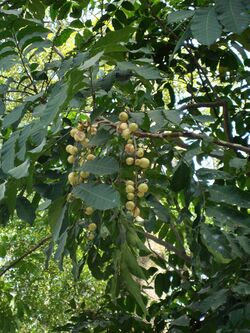Biology:Aphanamixis polystachya
| Pithraj tree | |
|---|---|

| |
| Fruits of Aphanamixis polystachya | |
| Scientific classification | |
| Kingdom: | Plantae |
| Clade: | Tracheophytes |
| Clade: | Angiosperms |
| Clade: | Eudicots |
| Clade: | Rosids |
| Order: | Sapindales |
| Family: | Meliaceae |
| Genus: | Aphanamixis |
| Species: | A. polystachya
|
| Binomial name | |
| Aphanamixis polystachya (Wall.) R.N. Parker
| |
| Synonyms[2] | |
| |
Aphanamixis polystachya, the pithraj tree, is a species of tree in the family Meliaceae. It is native to India , Pakistan , Nepal, Bhutan, Bangladesh, Myanmar and Sri Lanka.[3] It is a widely used as a medicinal plant in Ayurveda.[4]
Description
The Bengali name of the tree is royna (রয়না). Another name of this tree is pithraj (পিথরাজ). Oil is not edible and can be used as biodiesel and lighting. The very fine wood is used for construction and ship-making.[citation needed] The tree is 20m tall. Leaves are compound, imparipinnate, alternate; oblong-lanceolate, apex acuminate; base asymmetric; with entire margin. Flowers are polygamous and show panicles inflorescence. Fruit is a single seeded pale-reddish subglobose capsule.[5]
Common names
- Assamese—hakhori bakhori
- Bengali—tiktaraj, pitraj(রয়না)
- English—rohituka tree
- Hindi—harin-hara (हरिनहर्रा), harinkhana
- Kannada—mukhyamuttage, mullumuttaga, mulluhitthalu, roheethaka
- Khasi—dieng rata
- Kuki—sahala
- Malayalam—chemmaram, sem
- Manipuri—হৈৰাঙখোঈ heirangkhoi
- Marathi—raktharohida (रक्तरोहिडा')
- Rongmei—agan
- Sanskrit—anavallabha, ksharayogya, lakshmi, lakshmivana, lohita
- Sinhala—higul [6][7]
- Tamil—malampuluvan, sem, semmaram
- Telugu—chevamanu, rohitaka
Chemistry
The fruit shell contains triterpenes, aphanamixin. The bark contains tetranortriterpene, and aphanamixinin. The leaves contain diterpene, alcohol, aphanamixol and β-sitosterol. The seeds yield a limonoid, rohitukin, polystachin and others, an alkaloid, a glycoside and a saponin. A chromone and three flavonoid glycosides have been reported from the roots.[8]
References
- ↑ World Conservation Monitoring Centre 1998. In: IUCN 2006. 2006 IUCN Red List of Threatened Species. retrieved 30 April 2007."Aphanamixis polystachya.". http://www.iucnredlist.org/search/details.php/33616/all.
- ↑ "Aphanamixis polystachya (Wall.) R.Parker — the Plant List". http://www.theplantlist.org/tpl/record/kew-2643324.
- ↑ "Aphanamixis polystachya (Wall.) R. N. Parker | Species". http://indiabiodiversity.org/species/show/7585.
- ↑ "Medicinal uses of Aphanamixis polystachya-Pithraj Tree-செம்மரம் sem-ma-ram". Archived from the original on 2015-07-13. https://web.archive.org/web/20150713031201/http://www.tknsiddha.com/medicinal-uses-of-Aphanamixis-Polystachya.html. Retrieved 2015-07-12.
- ↑ "Aphanamixis polystachya - MELIACEAE". http://www.biotik.org/india/species/a/aphapoly/aphapoly_en.html.
- ↑ "Flora of Sri Lanka,Tree,Plant Species,Forests- SriLankaView". http://www.srilankaview.com/floraSL.htm.
- ↑ "Aphanamixis polystachya - Pithraj Tree". http://www.flowersofindia.net/catalog/slides/Pithraj%20Tree.html.
- ↑ "APHANAMIXIS POLYSTACHYA (Wall.) R.N. Parker". http://www.mpbd.info/plants/aphanamixis-polystachya.php.
Wikidata ☰ Q2715899 entry
 |


